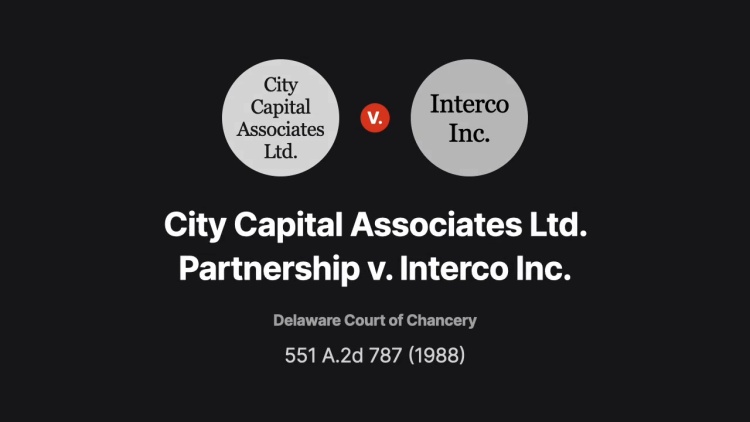City Capital Associates Ltd. Partnership v. Interco Inc.
Delaware Court of Chancery
551 A.2d 787 (1988)
- Written by Robert Cane, JD
Facts
In 1985, Interco Incorporated (defendant) perceived it was vulnerable to a takeover, so it adopted a shareholder-rights plan, or poison pill. In 1988, Steven and Mitchell Rales began accumulating Interco stock through City Capital Associates Ltd. Partnership (CCA) (plaintiff), which caused the Interco board to redeem its 1985 rights plan and adopt a new shareholder-rights plan. The new plan included both a flip-in provision, triggering after a person acquired 30 percent of outstanding Interco stock and a flip-over provision, triggering after an acquisition of 50 percent or more of Interco’s assets or earning power. Later, Interco’s chairman announced his intention to recommend a major restructuring. Soon after, the Rales brothers disclosed they owned 8.7 percent of Interco’s common stock, and CCA offered to acquire by merger Interco for $64 per share in cash. CCA increased its offer to $70 per share before Interco responded. At the next board meeting, Interco’s investment banker provided an analysis of the $70 offer and indicated the offer was inadequate because the company could be worth between $68 to $80 per share. The board rejected the proposal. The board also voted to decrease the percentage needed to trigger the flip-in provision to 15 percent. A week later, the Rales brothers announced a tender offer for all outstanding shares of Interco stock at $70 per share, conditioned upon the redemption of the shareholder-rights plan. The board determined the tender offer was inadequate based on Interco’s banker’s opinion. CCA increased its offer to $72 per share, which the board found inadequate and rejected. In addition, the board adopted a restructuring proposal that would aim to provide shareholders with about $66 per share in dividends and debentures and a stub share with a price of at least $10. CCA increased its offer to $74 per share. The board rejected the offer as inadequate because the proposed restructuring could provide $76 in value per share. CCA applied for a preliminary injunction in the Delaware Court of Chancery to compel Interco to redeem its shareholder-rights plan.
Rule of Law
Issue
Holding and Reasoning (Allen, J.)
What to do next…
Here's why 907,000 law students have relied on our case briefs:
- Written by law professors and practitioners, not other law students. 47,100 briefs, keyed to 996 casebooks. Top-notch customer support.
- The right amount of information, includes the facts, issues, rule of law, holding and reasoning, and any concurrences and dissents.
- Access in your classes, works on your mobile and tablet. Massive library of related video lessons and high quality multiple-choice questions.
- Easy to use, uniform format for every case brief. Written in plain English, not in legalese. Our briefs summarize and simplify; they don’t just repeat the court’s language.





